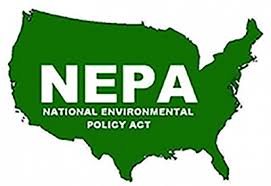More Unforced Errors in the 2023 NEPA Amendments
Bluntly speaking, the statute is a mess.
When the 2023 amendments to NEPA passed as part of the debt ceiling bill, I wrote a series of blog posts about the drafting errors. It turns out that I missed some, as I discovered when working on the new edition of my environmental law casebook. They really aren’t all that subtle, and it’s hard to see how they got through the legislative process without anyone noticing. The Strange Case of the Alternative Alternatives I found the first new set of problems when I...
CONTINUE READINGEvaluating Voluntary Agreements in the Bay-Delta Watershed
by Nell Green Nylen, Felicia Marcus, Dave Owen, and Michael Kiparsky
Updates to flow and other regulatory requirements for California’s Bay-Delta watershed are long overdue. For much of the last 12 years, state political leadership has prioritized efforts to develop voluntary agreements (VAs) with water users over completing updates to the watershed's water quality standards. Now the State Water Resources Control Board has restarted the regulatory process and is considering what role proposed VAs will play in it. Our new policy pa...
CONTINUE READINGThe Statutory EIS Process: A Primer
Last year, Congress tried to codify NEPA law. Here’s how the process is supposed to work.
Because NEPA’s discussion of environmental impact statements (EIS) was very brief, the requirements and procedures were elaborated by courts and guidance from a White House office. That changed in 2023, because much of the subject is now covered explicitly by new statutory language.. Thus, NEPA is a bit less of a “common law” subject than it used to be. Here are the key questions that have to be addressed in applying NEPA to an agency action and the answers ...
CONTINUE READINGClimate Election 2024: Trump Plans to Drain the EPA
The battle plan for a second Trump term includes reinstating Schedule F to remove climate experts from the U.S. government.
Donald Trump could “F” the federal government. Literally. Far-right policy strategists are laying plans, largely endorsed by the Trump campaign, for getting rid of federal government workers who might otherwise stand in the way of a radical deregulation agenda. It’s called “Schedule F,” and it could be used to strip employment protections from as many as 50,000 federal employees. That would allow a Trump administration to exert far more influence over pe...
CONTINUE READINGWindmills are Killing Our Donuts! And It’s All Biden’s Fault!
A peek inside the mind of a leading presidential candidate.
Donald Trump has been talking a lot about donuts lately. Donuts, it seems, are threatened by renewable energy and depend on fossil fuels. Maybe because he’s heard that they’re cooked in oil? Trump’s knowledge of cooking is likely pretty minimal, given that it’s unlikely he’s ever been inside a kitchen. And windmills are terrible, just terrible. Putting the two theories together, the idea seems to be that windmills are killing donuts. Imagine the blades, ch...
CONTINUE READING7 Reasons California Should Get Tougher on Methane from Dairies
California lawmakers should rethink the role of dairy digesters in the state's dairy and livestock mitigation strategy.
Even though California aims to decrease the emissions of methane, dairy operations are rewarded for creating, and capturing, more and more of the planet-warming super pollutant in the form of manure-derived biogas. Today, California lawmakers declined to correct that perverse incentive, but they still have opportunities to rethink the state's embrace of digesters as its primary mitigation tactic. This morning, the Emmett Institute released a policy report analyzin...
CONTINUE READINGThe Unique Legal Context of EPA Methane Regulations
Three separate congressional actions intersect to support the regulations.
The government's efforts to control methane have followed a complicated path, involving three different congressional actions: section 111 of the Clean Air Act, which allows EPA to regulate emissions of greenhouse gases; a congressional override of an earlier regulatory action; and a newer statute that creates a fee on methane emissions. The upshot is to provide legal support for Biden's effort to impose methane emission limits. The complex history of federal me...
CONTINUE READINGHow Can Cities Ensure EV Charging Accessibility for Lower-Income Drivers?
Watsonville, California as a Case Study for Policymakers
California's ambitious goal to end the sale of internal combustion engine passenger vehicles by 2035 will require addressing the challenges faced by lower- and moderate-income drivers in accessing battery-powered electric vehicles (EVs). Chief among these concerns is their need to have a convenient and affordable place to charge the vehicles. Currently these residents too often experience limited access to EV charging stations, especially in lower-income communities c...
CONTINUE READINGClimate Justice, Climate Finance and Pragmatism for Tropical Jurisdictions at COP28
Exploring the urgency of subnational climate action: insights from COP28 on financing tropical forest conservation, indigenous empowerment, and sustainable livelihoods by the Governors' Climate and Forests Task Force network.
The Governors' Climate and Forests Task Force (GCF Task Force) engaged in the 28th Conference of the Parties (COP28) to the United Nations Framework Convention on Climate Change (UNFCCC) held in Dubai, marking a pivotal moment in the global climate dialogue. This significant international forum serves as a crucial platform where nations, subnational entities, and civil society collaborate to address climate change challenges. During the conference weeks in Dubai (Decembe...
CONTINUE READINGThe Year Ahead in California Climate Laws
Facing a $37.9 billion deficit, California’s 2024 legislative session is likely to be about minor fixes, cleanup bills, and the ballot box. Plus: Will 2023’s disclosure bills get funded?
Though I do not have a crystal ball — wish I did! — there are some clear markers we can evaluate to foresee environmental priorities, and possibilities, as we start another exciting year in the California Legislature. The California Legislature kicked off the 2024 session on January 3 with notable changes in leadership. Robert Rivas, who represents the 29Assembly District, primarily based in Salinas, began his first full term as Speaker of the ...
CONTINUE READING












